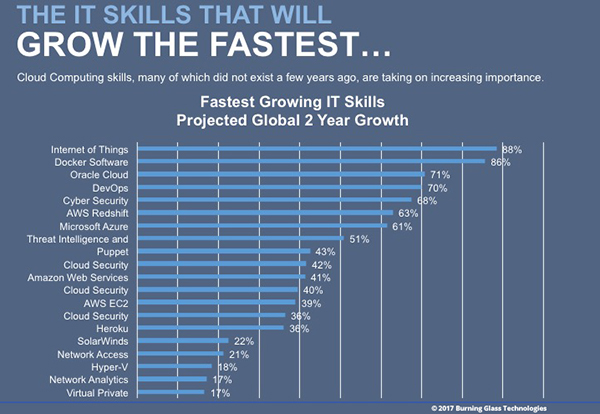Who wouldn’t want to have their favorite drink ready when they get home after a long day at work? Even better, what if you could take care of some everyday tasks with just a click? Wouldn’t that cut down on stress? We’re not far from a time when we can control real-life objects digitally. This is the goal of the Internet of Things (IoT), which is why there’s so much excitement about it right now. IoT development is advancing rapidly; global spending on IoT was expected to reach $772.5 billion in 2018, according to IDC. Gartner predicts around 20.8 billion devices will be connected by 2020, which is nearly three times the current world population of seven billion. Both Gartner and Statista estimate that the IoT-driven semiconductor industry will be valued at about $45 billion by 2020, as the demand for complex tasks through IoT means that sensors and semiconductor materials will be crucial for smarter and more efficient data collection.
Shortage of talent despite the opportunities in IoT
Despite the huge potential value IoT offers, there is a major barrier to its growth: a lack of relevant IoT skills that could limit the high demand. IoT covers a wide range of areas across various fields, requiring different skills such as data analytics, embedded software development, app development, and cloud computing. As IoT starts to be used in many industries, a large number of jobs are predicted to be created. India’s telecom secretary Aruna Sundararajan estimates that IoT will create 10-15 million jobs in India alone. Therefore, if one country is projected to generate such a large number of jobs, it is reasonable to expect that global job creation through IoT could exceed 25 million in the future.

Although all these forecasts predict excellent opportunities for businesses relying on IoT and for technology sectors there is a grim side to these numbers that is often overlooked. In a research published by Inmarsat titled ‘The Future of Enterprise in IoT -2017’ conducted by interviewing five hundred respondents involved in IoT based solutions, a startling 47% said there is a lack of necessary skills in IoT and only 20% felt that they had the requisite skills. As a result of the shortage of skills, the research found that organizations are looking towards working in a collaborative manner to fill the skill gaps in IoT to deliver IoT solutions successfully. So it can be easily concluded that any major IoT based development requires coordination and collaboration of developers from a variety of domains.Hence to avoid stifling the IoT driven growth, it is imperative that employers take relevant measures to prevent a potential stagnation in the growth of IoT.
A brief look at the solutions available
Essentially there are two possible solutions to mitigate this shortage of IoT oriented skill set and bring together developers from all niche areas:
- A hire and train model
This is undoubtedly an expensive model for companies considering the need for a large allocation of resources. This model requires employers to hire people and train them in specific areas where the employer works. It is essentially a long-term investment until its benefits can be reaped. However, owing to the need for easier skill transferability, flexible skill sets and several others due to the nature of work in the world today characterized by frequent job changes, companies are largely abandoning the practice of hiring and providing training as this Bloomberg article accurately analyzes the reason.
- Contractually hiring developers from all over the world through a platform
This model enables a company to hire developers through a platform for specific projects and thereafter pay them through the platform once the contract work is completed. This model is extremely economical and it brings together developers from all over the world with minimum logistical needs.
The way forward with Blockchain Tech
A brief overview of the two solutions makes it evident that contractual hiring is possibly the best solution employers have at hand. Although contractual hiring is not a new phenomenon, in order to be able to access the talent pool from around the world a platform needs to be set up to make that possible.
This is where the innovative Blockchain technology comes into the spotlight. Blockchain enables an environment where employers can create ‘smart contracts’ and utilize it to hire developers from anywhere. Once a contract is established between the parties involved, contracts become smart by their ability to automatically execute functions depending on whether the terms in the contracts are fulfilled or not without third party interferences.
LeewayHertz, Hurify, Techracers are some of the companies that offer solutions in smart contracts based on Ethereum platform.
Hurify, in particular, seeks to specialize in blockchain based contractual hiring; it utilizes the technology to make smart contracts and essentially their whole process revolves around enabling a platform tailored for clients to broadcast the project requirement, look for developers, enter smart contracts and get the projects done. Now that level of simplicity is quite impressive and is essential in tapping the market potential IoT is poised to make as per the forecasts.
The essential take away
IoT is a technology that has enormous potential to make a positive impact on businesses, to increase consumer spending on technology-based products and to transform the industrial practices in several areas in order to improve their efficiencies. Given the challenges involved in integrating various platforms like cloud, edge analytics, software applications and many others together in order to establish a connection between devices, IoT development will certainly be affected by the shortage of relevant skill sets hence collaborative ways of development may be the only possible way forward.